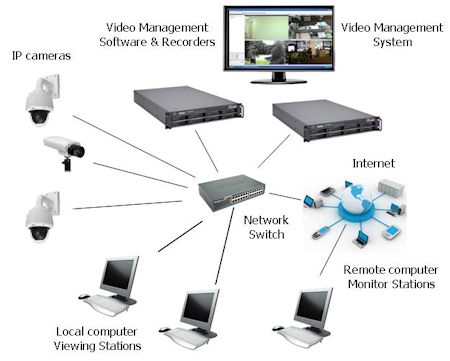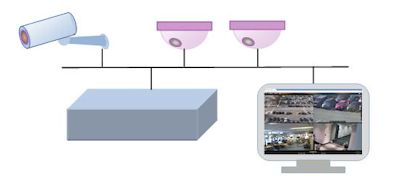Review of Video Management and Recording Systems
Video Management Software | Network Video Recorders | Camera Comparisons | Purchase | Resources
The video management and recording system is used in an IP camera system to manage the IP cameras and record the video. The video management includes video storage, display of real-time video, and review of historic video recordings.
There are three types of recording systems for IP camera systems to consider. Each one provides some unique capability.
Video Management Software (VMS)
There are several types of VMS software that runs on your Windows computer and can be scaled to any size of IP camera system. Read more…
Network Video Recorder (NVR)
This video recording system is a complete solution that includes the computer and software. Read more…
Video Management Cloud Service
This cloud solution provides remote recording (over the Internet) for IP cameras at many different locations. It doesn’t require any computer at your location. The number of cameras supported at each location depends on the Internet bandwidth available. Read more…

Overview of Video Management and Recording Systems
The Video Management Software (VMS) is a key part of your IP camera system. If you select the wrong system, you could be without the critical video evidence you need when an incident occurs, or, worse still, your security could be breached and your safety threatened because of the wrong choice. You can also enable protected storage for your IP camera system to protect the evidence chain. To learn more about the VMS options, please watch our video on Video Management Software Advances.
We compared the VMS from Qognify to the WAVE software from Hanwha. We also compared two different NVR systems and one cloud system. The two different NVR systems were selected because of the different capabilities they provided. The NVR can be an open system, in that it supports a very large number of camera brands, or it can be a proprietary NVR from a camera manufacturer that supports a limited brand of cameras. The review tries to highlight the differences and advantages of each recording system. We left out some of the common features such as viewing multiple cameras, scheduling recording, and client viewing software since they all support this.
Comparison of IP Video Recording Systems
Video Management Software
There are several video management software solutions, including HxGN dC3 from Hexagon, and Wave. Hexagon provides the most advanced functionality, while WAVE is the easiest to use. For a comparison of available VMS, see our Video Management Software Comparison table.
Here are some more details of the Ocularis solution.
Video Management Software Ocularis
OVERVIEW: Ocularis 5 Video Management Software (VMS) from Qognify is available in different versions depending on the feature set required. Since you only pay for the version you need, it can be a very economical solution. This software runs on a Windows platform. It is designed to support very large enterprise IP Camera systems. It supports thousands of cameras on multiple recording servers. The client software runs on as many computers as required and allows you to view any camera or set of cameras from any of the recording servers.
PROS AND CONS:
- A very flexible system that supports a very large number of cameras manufacturers.
- It provides a range of solutions from medium to very large IP camera systems at multiple locations.
- Includes excellent alert notification including “push video” to selected consoles.
- Includes many powerful search and retrieval tools.
- Includes customizable video displays and alert notifications.
- Ocularis 5 supports edge recording at the cameras.
- Supports two-way audio and intercoms.
- Flexibility leads to the complexity of installation and use, so some training may be required.
Network Video Recorders (NVR)
Exacq NVR
OVERVIEW: Exacq is an example of an open type of Network Video Recorder that supports many different brands of IP cameras. These systems can support hundreds of cameras from many different manufacturers. Exacq provides complete NVR solution. The model is determined by the maximum number of cameras supported and the size of storage. Some systems allow NAS to be added.
PROS AND CONS:
- Very easy to install and use.
- Open non-proprietary system
- Supports a very large number of camera brands.
- Includes flexible alert notification, but doesn’t support “push video”
- Two-way audio is very limited, and edge recording is not supported.
Proprietary NVR from Hikvision and Hanwha (Samsung)
OVERVIEW: The Hanwha (Samsung) NVRs support many different manufacturer’s cameras. If the cameras conform to (Open Network Video Interface Forum) specifications, the NVR will support them.
The latest NVRs can support small to medium security systems. They provide full functional capability when the manufacturer’s cameras are used. These NVRs also support other brands of cameras such as Axis, Sony and other cameras that conform to ONVIF.
The latest WAVE NVRs from Hanwha are excellent for medium to large sized IP camera systems because they can be tied together to create one managed video system. The WAVE software is also available without the NVR platform. It can run on your own Windows PC. The NVR systems are specified by the maximum number of cameras supported and how long you want to record the video.
PROS AND CONS:
- Easy to install and use.
- Two-way audio is supported on the Hanwha WAVE NVR
- Proprietary and ONVIF Cameras are supported
- Supports a fixed number of cameras. For example, there are 4-camera, 8-camera, 16-camera and larger models. Once you reach the camera limit you will need to purchase another NVR.
- Does not include advanced management and analytic features.
- Relies on camera functions for alarm conditions.
- Edge recording is not supported.
Cloud Video Recording
Cloud Service
OVERVIEW: Cloud type systems are actually remote servers that provide the video recording at a remote location. The cloud system primarily provides video recording for a limited number of cameras. Requires cameras with edge alarm detection. Outbound Internet bandwidth determines the number of cameras that can be supported.
PROS AND CONS:
- No computer equipment is required
- The number of cameras supported is limited by the outbound bandwidth.
- Usually, not more than 5 or 6 cameras can be supported.
- Open system
- Motion detection and other alarms must be provided by the cameras.
What is a Video Recording System
A video recording system is an essential part of your IP camera system. It is designed to record the video from all your IP cameras, as well as manage the video that is displayed. The recording system can be implemented using software that runs on your computer or in a network video recorder (NVR), or a remote server (Cloud). The recording system handles a lot of data so requires higher performance computer systems.
Comment: Many NVR and VMS systems just record video, but there are others that provide features that increase your security. The Recording system is a key part of the CCTV surveillance system.
Ocularis is an excellent and flexible Video Management Software solution. It provides the best alert handling, so makes it the best choice when you need active alarms and notification. It is also the best choice for complex IP security systems that integrate IP door access control, intercoms or other security platforms. It is the only system that supports two-way audio. It has proven to be a very reliable system.
Exacq is a top rated NVR solution. It is very reliable and includes a wide range of capability making it a good choice in many applications. Exacq is primarily an NVR solution and includes the ability to operate on a Windows or Linux platform supporting up to 128 cameras per server. Since the server usually comes with the NVR solution, the hardware is right for the task. It doesn’t support intercoms and remote door controls as well as the Ocularis solution.
In general, the NVR systems are very simple inexpensive solutions that are perfect if you just need to record the video. Be careful to make sure that the cameras you plan to use are supported by these NVRs.
The Hikvision and Hanwha (Samsung) are proprietary NVRs that are a good choice when you plan to use the manufacturer’s cameras. It is recommended for small to medium systems.
Cloud offers remote recording services. Cloud services usually support only 4 to 8 cameras per location and is best for small security and surveillance applications.
The right system for you is based on your security and safety objectives. Yes, selecting the right video recording system can be complicated, so please rely on us for help selecting not only the recording software but also your complete IP camera system. We are the experts in IP connected security products. We provide free consulting and the very best pricing so you get exactly what you need at the best price.
Video Recording Summary and Conclusion:
The video recording system does more than just record the video, it also provides user management, camera management, real-time displays, audio support and alerts from alarms, and more. Your IP camera system is not complete without the video recording and camera management system.

Where do you begin? As usual, we start at the objectives. Do you want to just have a record of someone who stole the laptop, or do you want to catch them in the act of stealing it? Do you have a security team that is watching the video in real time? Do you want to stop people from climbing the fence or entering a secure area? Take a look at our article about understanding your objectives. Once you know what you need you can make use of this comparison and review table.
Need more information? Just contact us If you would like some help with your IP Camera System, please contact us: 1-800-431-1658 914-944-3425 (outside the USA) FAX: 914-944-0717